List of Knight's Cross of the Iron Cross recipients (O)
The Knight's Cross of the Iron Cross (German: Ritterkreuz des Eisernen Kreuzes) and its variants were the highest awards in the military and paramilitary forces of Nazi Germany during World War II. The Knight's Cross of the Iron Cross was awarded for a wide range of reasons and across all ranks, from a senior commander for skilled leadership of his troops in battle to a low-ranking soldier for a single act of extreme gallantry.[1] A total of 7,321 awards were made between its first presentation on 30 September 1939 and its last bestowal on 17 June 1945.[Note 1] This number is based on the analysis and acceptance of the order commission of the Association of Knight's Cross Recipients (AKCR). Presentations were made to members of the three military branches of the Wehrmacht—the Heer (Army), Kriegsmarine (Navy) and Luftwaffe (Air Force)—as well as the Waffen-SS, the Reichsarbeitsdienst (RAD—Reich Labour Service) and the Volkssturm (German national militia). There were also 43 recipients in the military forces of allies of the Third Reich.[3]
These recipients are listed in the 1986 edition of Walther-Peer Fellgiebel's book, Die Träger des Ritterkreuzes des Eisernen Kreuzes 1939–1945 — The Bearers of the Knight's Cross of the Iron Cross 1939–1945. Fellgiebel was the former chairman and head of the order commission of the AKCR. In 1996, the second edition of this book was published with an addendum delisting 11 of these original recipients. Author Veit Scherzer has cast doubt on a further 193 of these listings. The majority of the disputed recipients had received the award in 1945, when the deteriorating situation of Germany in the final days of World War II in Europe left a number of nominations incomplete and pending in various stages of the approval process.[4]
Listed here are the 82 Knight's Cross recipients whose last name starts with "O".[5] Scherzer has challenged the validity of two of these listings.[6] The recipients are ordered alphabetically by last name. The rank listed is the recipient's rank at the time the Knight's Cross was awarded.
Background
The Knight's Cross of the Iron Cross and its higher grades were based on four separate enactments. The first enactment, Reichsgesetzblatt I S. 1573 of 1 September 1939 instituted the Iron Cross (Eisernes Kreuz), the Knight's Cross of the Iron Cross and the Grand Cross of the Iron Cross (Großkreuz des Eisernen Kreuzes). Article 2 of the enactment mandated that the award of a higher class be preceded by the award of all preceding classes.[7] As the war progressed, some of the recipients of the Knight's Cross distinguished themselves further and a higher grade, the Knight's Cross of the Iron Cross with Oak Leaves (Ritterkreuz des Eisernen Kreuzes mit Eichenlaub), was instituted. The Oak Leaves, as they were commonly referred to, were based on the enactment Reichsgesetzblatt I S. 849 of 3 June 1940.[8] In 1941, two higher grades of the Knight's Cross were instituted. The enactment Reichsgesetzblatt I S. 613 of 28 September 1941 introduced the Knight's Cross of the Iron Cross with Oak Leaves and Swords (Ritterkreuz des Eisernen Kreuzes mit Eichenlaub und Schwertern) and the Knight's Cross of the Iron Cross with Oak Leaves, Swords and Diamonds (Ritterkreuz des Eisernen Kreuzes mit Eichenlaub, Schwertern und Brillanten).[9] At the end of 1944 the final grade, the Knight's Cross of the Iron Cross with Golden Oak Leaves, Swords, and Diamonds (Ritterkreuz des Eisernen Kreuzes mit goldenem Eichenlaub, Schwertern und Brillanten), based on the enactment Reichsgesetzblatt 1945 I S. 11 of 29 December 1944, became the final variant of the Knight's Cross authorized.[10]
Recipients
The Oberkommando der Wehrmacht (Supreme Command of the Armed Forces) kept separate Knight's Cross lists for the Heer (Army), Kriegsmarine (Navy), Luftwaffe (Air Force) and Waffen-SS. Within each of these lists a unique sequential number was assigned to each recipient. The same numbering paradigm was applied to the higher grades of the Knight's Cross, one list per grade.[11] Of the 82 awards made to servicemen whose last name starts with "O", seven were later awarded the Knight's Cross of the Iron Cross with Oak Leaves and four the Knight's Cross of the Iron Cross with Oak Leaves and Swords; seven presentations were made posthumously. Heer members received 52 of the medals, six went to the Kriegsmarine, 21 to the Luftwaffe, and three to the Waffen-SS.[5] The sequential numbers greater than 843 for the Knight's Cross of the Iron Cross with Oak Leaves are unofficial and were assigned by the Association of Knight's Cross Recipients (AKCR) and are therefore denoted in parentheses.[12]
| Name | Service | Rank | Role and unit[Note 2] | Date of award | Notes | Image |
|---|---|---|---|---|---|---|
| Eduard Obergethmann | Luftwaffe | Oberstleutnant[13] | Commander of Flak-Regiment 99 (motorized)[14][Note 3] | 24 January 1943[13] | — |
— |
| Hans Oberhofer | Heer | Hauptmann[13] | Company chief in the II./Jäger-Regiment 25 (L)[13][14] | 23 March 1945*[13] | Died of wounds 20 February 1945[14] | — |
| Karl Oberkircher | Heer | Oberjäger[13] | Group leader in the 6./Gebirgsjäger-Regiment 218[13][14] | 12 October 1943[13] | — |
— |
| Werner Oberländer | Luftwaffe | Oberleutnant[13] | Pilot in the 2./Kampfgeschwader 55[13][15] | 24 March 1943[13] | — |
— |
| Walther Oberloskamp | Heer | Leutnant of the Reserves[13] | Zugführer (platoon leader) in the 3./Sturmgeschütz-Abteilung 667[13][15] | 10 May 1943[13] | — |
— |
| Dr. jur. Fritz Graf von Oberndorff | Heer | Major of the Reserves[13] | Commander of Aufklärungs-Abteilung 34[13][15] | 25 August 1941[13] | — |
— |
| Herbert Oberweg | Luftwaffe | Oberfähnrich[13] | Observer in the 11.(H)/Aufklärungs-Gruppe 13[15][Note 4] | 8 August 1944[13] | — |
— |
| Erich Oberwöhrmann | Heer | Hauptmann[13] | Leader of Panzer-Abteilung "Feldherrnhalle"[13][15] | 7 February 1944[13] | — |
— |
| Friedrich Obleser | Luftwaffe | Leutnant[13] | Staffelführer of the 8./Jagdgeschwader 52[13][15] | 23 March 1944[Note 5] | — |
— |
| Alois Obschil | Waffen-SS | SS-Obersturmführer[Note 6] | Leader of the 2./Grenadier-Regiment 1126[13][15] | 28 March 1945[13] | — |
— |
| Walter Obst | Heer | Leutnant[13] | Leader of the 4./Panzergrenadier-Regiment 66[13][15] | 30 November 1943*[13] | Died of wounds 10 October 1943[15] | — |
| Hans von Obstfelder+ | Heer | General der Infanterie[16] | Commanding general of the XXIX. Armeekorps[15][16] | 27 July 1941[16] | Awarded 251st Oak Leaves 7 June 1943 110th Swords 5 November 1944[16] |
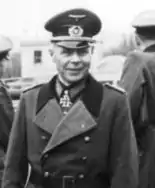 |
| Wolfgang von Obstfelder+ | Heer | Hauptmann[16] | Commander of schwere Panzer-Jäger-Abteilung 346[15][Note 7] | 10 September 1944[16] | Awarded (858th) Oak Leaves 30 April 1945[16] | — |
| Heinrich Ochs+ | Heer | Oberfeldwebel[16] | Zugführer (platoon leader) in the 1./Panzer-Jäger-Abteilung 101[15][16] | 2 June 1943[16] | Awarded 360th Oak Leaves 30 December 1943[16] | — |
| Willifrank Ochsner[Note 8] | Heer | Oberst[16] | Commander of the 31. Infanterie-Division[15][16] | 18 January 1944[16] | — |
— |
| Heinrich Ochßner | Heer | Major[16] | Commander of Divisions-Füsilier-Bataillon 132[15][16] | 19 August 1944[16] | — |
— |
| Job Odebrecht | Luftwaffe | General der Flakartillerie[16] | Commanding general of the II. Flakkorps (motorized)[15][Note 9] | 5 September 1944[16] | — |
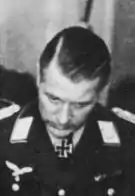 |
| Wilhelm Odenhardt | Luftwaffe | Oberfeldwebel[16] | Observer in the 4./Kampfgeschwader 4 "General Wever"[15][16] | 29 October 1944[Note 10] | — |
— |
| Erich Oeckel | Heer | Oberleutnant[16] | Chief of the 5./Schützen-Regiment 4[15][16] | 24 June 1940[16] | — |
— |
| Heinz Oehl | Heer | Leutnant[16] | Leader of the 1./Grenadier-Regiment 62[15][16] | 25 July 1943*[16] | Killed in action 5 July 1943[16] | — |
| Dr. Hermann Oehmichen | Heer | Oberstleutnant | Leader of Kampfgruppe "Oehmichen"[15][Note 11] | 27 December 1942[16] | — |
— |
| Victor Oehrn | Kriegsmarine | Kapitänleutnant[16] | Commander of U-37[15][16] | 21 October 1940[16] | — |
— |
| Johann-Peter Oekenpöhler | Luftwaffe | Oberfeldwebel[17] | Pilot in the 8./Kampfgeschwader 27 "Boelcke"[15][17] | 2 June 1943[17] | — |
— |
| Heinrich Oelker | Heer | Hauptmann[17] | Leader of Divisions-Füsilier-Bataillon 21 (L)[15][17] | 26 March 1944[17] | — |
— |
| Karl Oepke | Heer | Hauptmann[17] | Chief of the 6./Artillerie-Regiment 12[17][18] | 16 April 1944[17] | — |
— |
| Walter Oesau+ | Luftwaffe | Hauptmann[17] | Staffelkapitän of the 7./Jagdgeschwader 51[17][18] | 20 August 1940[17] | Awarded 9th Oak Leaves 6 February 1941 3rd Swords 15 July 1941[Note 12] |
— |
| Jürgen Oesten | Kriegsmarine | Kapitänleutnant[17] | Commander of U-106[17][18] | 26 March 1941[17] | — |
— |
| Albert Oesterlin | Kriegsmarine | Kapitänleutnant of the Reserves[17] | Chief of the Küstenschutzflottille "Attika"[18][Note 13] | 9 June 1944*[17] | Killed in aerial bombardment 22 January 1944[18] | — |
| Karl Österreicher | Heer | Gefreiter[17] | Machine gunner in the 11./Grenadier-Regiment 186[17][18] | 18 December 1942[17] | — |
— |
| Karl-Heinz Oesterwitz+ | Heer | Oberleutnant[17] | Chief of the 7./Bau-Lehr-Regiment z.b.V. 800 "Brandenburg"[17][18] | 30 April 1943[17] | Awarded 734th Oak Leaves 10 February 1945[17] | — |
| Heinrich Ofenloch | Heer | Unteroffizier[Note 14] | Group leader in the 1./Pionier-Bataillon 323[17][18] | 12 July 1943[17] | — |
— |
| Karl Offschany | Heer | Feldwebel[17] | Zugführer (platoon leader) in the 9./Infanterie-Regiment 191[17][18] | 7 March 1941[17] | — |
— |
| Walter Ohlrogge | Luftwaffe | Feldwebel[17] | Pilot in the 5./Jagdgeschwader 3[17][18] | 4 November 1941[17] | — |
— |
| Walter Ohmsen | Kriegsmarine | Oberleutnant (M.A.)[19] | Chief of the Marinebatterie "Marcouf" (Marine-Artillerie-Abteilung 260)[18][Note 15] | 14 June 1944[19] | — |
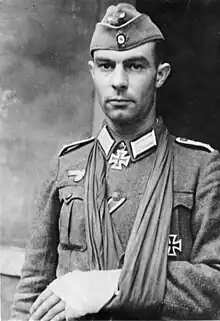 |
| Horst Ohrloff | Heer | Oberleutnant[19] | Chief of the 11./Panzer-Regiment 25[18][19] | 27 July 1941[19] | — |
— |
| Wilhelm Okrent | Heer | Obergefreiter[19] | Richtkanonier (gunner) in the 4./Panzer-Artillerie-Regiment 116[18][19] | 2 April 1943[19] | — |
— |
| Erich Olboeter | Waffen-SS | SS-Sturmbannführer[19] | Commander of the III.(gepanzert)/Panzergrenadier-Regiment 26 "Hitlerjugend"[18][19] | 28 July 1944[19] | — |
— |
| Friedrich Olbricht?[Note 16] | Heer | Generalleutnant | Commander of the 24. Infanterie-Division[18] | 27 October 1943 | — |
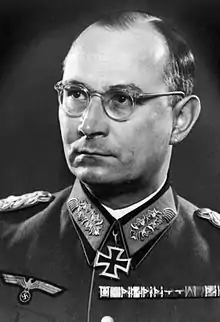 |
| Robert Olejnik | Luftwaffe | Oberleutnant[19] | Staffelkapitän of the 4./Jagdgeschwader 1[18][Note 17] | 27 July 1941[Note 17] | — |
— |
| Herbert Oll | Heer | Hauptmann[19] | Commander of the I./Artillerie-Regiment 78[18][19] | 23 August 1941[19] | — |
— |
| Georg Olschewski | Kriegsmarine | Oberleutnant (Ing.)[19] | Chief engineer on U-66[18][19] | 23 April 1944[19] | — |
— |
| Emil Omert | Luftwaffe | Leutnant[19] | Pilot in the III./Jagdgeschwader 77[18][Note 18] | 19 March 1942[19] | — |
— |
| Leon von Ondarza | Heer | Oberst[19] | Commander of Panzer-Artillerie-Regiment 2[18][19] | 2 September 1944[19] | — |
— |
| Hermann Opdenhoff | Kriegsmarine | Oberleutnant zur See[19] | Commander Schnellboot S-31 in the 2. Schnellbootflottille[21][Note 19] | 16 May 1940[19] | — |
— |
| Heinz-Eberhard Opitz | Heer | Oberstleutnant[19] | Commander of Grenadier-Regiment 911[19][21] | 11 March 1945[19] | — |
— |
| Hermann von Oppeln-Bronikowski+ | Heer | Oberst[22] | Commander of Panzer-Regiment 204[21][22] | 1 January 1943[22] | Awarded 536th Oak Leaves 28 July 1944 142nd Swords 17 April 1945[22] |
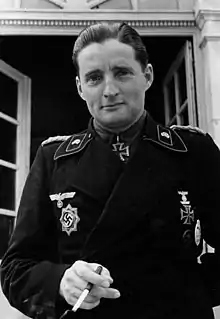 |
| Kurt Oppenländer | Heer | Generalmajor[22] | Commander of the 305. Infanterie-Division[21][22] | 25 July 1942[22] | — |
— |
| Walter Oppermann | Heer | Feldwebel[22] | Zugführer (platoon leader) in the 7./Jäger-Regiment 38[21][22] | 5 May 1943*[22] | Died of wounds 20 March 1943[22] | — |
| Egon Orinschnig | Heer | Oberleutnant[22] | Chief of the 10./Infanterie-Regiment 266[21][22] | 13 June 1941[22] | — |
— |
| Ralph Graf von Oriola | Heer | Generalleutnant[22] | Commander of the 299. Infanterie-Division[21][22] | 23 December 1943[22] | — |
— |
| Helmuth Orlowski | Luftwaffe | Major[22] | Gruppenkommandeur of the Fernaufklärungs-Gruppe 122[21][22] | 19 September 1943[22] | — |
— |
| Heinrich Orth | Luftwaffe | Oberfeldwebel[22] | Zugführer (platoon leader) in the 4./Fallschirmjäger-Sturm-Regiment[21][Note 20] | 18 March 1942*[22] | Killed in action 10 March 1942[21] | — |
| Karl Orth | Heer | Grenadier[22] | In the 13./Grenadier-Regiment 453[21][22] | 3 March 1944[22] | — |
— |
| Alfons Orthofer | Luftwaffe | Hauptmann[22] | Gruppenkommandeur of the II./Sturzkampfgeschwader 77[21][22] | 23 November 1941[22] | — |
— |
| Karl Ortlieb | Heer | Oberstleutnant[22] | Commander of Grenadier-Regiment 754[21][22] | 10 September 1944[22] | — |
— |
| Ernst Orzegowski | Luftwaffe | Fahnenjunker-Feldwebel[22] | Pilot in the 7./Schlachtgeschwader 10[21][22] | 14 January 1945[22] | — |
— |
| Theodor Ossege | Heer | Oberjäger[22] | Group leader in the 1./Jäger-Regiment 56[21][22] | 5 September 1944*[22] | Killed in action 29 July 1944[21] | — |
| Werner Ostendorff+ | Waffen-SS | SS-Obersturmbannführer[23] | Ia (operational officer) of SS-Division "Das Reich"[21][23] | 13 September 1941[23] | Awarded (861st) Oak Leaves 6 May 1945[Note 21] |  |
| Dieter Oster | Luftwaffe | Oberleutnant[23] | Chief of the 2./Flak-Regiment 8 (motorized)[21][Note 22] | 9 December 1942[23] | — |
— |
| Wilhelm Osterhold+ | Heer | Major[23] | Commander of the III./Füsilier-Regiment 27[21][23] | 26 March 1944[23] | Awarded 732nd Oak Leaves 10 February 1945[23] | — |
| Theodor Osterkamp | Luftwaffe | Generalmajor[23] | Jagdfliegerführer of Luftflotte 2[21][Note 23] | 22 August 1940[23] | — |
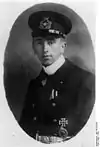 |
| Felix Ostermann | Heer | Hauptmann[23] | Leader of Divisions-Bataillon 260[21][23] | 26 August 1943[23] | — |
— |
| Max-Hellmuth Ostermann+ | Luftwaffe | Leutnant[23] | Pilot in the 7./Jagdgeschwader 54[23][25] | 4 September 1941[23] | Awarded 81st Oak Leaves 12 March 1942 10th Swords 17 May 1942[23] |
— |
| Hans-Arno Ostermeier+ | Heer | Hauptmann of the Reserves[23] | Leader of a Kampfgruppe in the Panzergrenadier-Division "Feldherrnhalle"[26][Note 24] | 23 August 1944[23] | Awarded 834th Oak Leaves 15 April 1945[23] | — |
| Franz Oswald | Luftwaffe | Hauptmann[23] | Staffelkapitän of the 13.(Panzer)/Schlachtgeschwader 9[23][25] | 24 October 1944[23] | — |
— |
| Oskar Otolski | Luftwaffe | Major[23] | Gruppenkommandeur of (Fern)Aufklärungs-Gruppe 2[23][25] | 30 September 1944[23] | — |
— |
| Eugen Ott | Heer | General der Infanterie[23] | Commanding general of the LII. Armeekorps[23][25] | 25 December 1942[23] | — |
— |
| Heinz Ott?[Note 25] | Heer | Oberwachtmeister | Zugführer (platoon leader) in the 12./Panzer-Regiment 24[25] | 9 May 1945 | — |
— |
| Helmuth Ott | Heer | Oberleutnant of the Reserves[23] | Chief of the 3./Grenadier-Regiment 97[23][25] | 16 November 1943[23] | — |
— |
| Joachim Ott | Heer | Hauptmann of the Reserves[27] | Leader of the I./Jäger-Regiment 28[25][27] | 28 October 1944[27] | — |
— |
| Rudolf Ott | Heer | Oberst[27] | Commander of Jäger-Regiment 56[25][27] | 28 February 1945[27] | — |
— |
| Norbert Ottawa | Heer | Hauptmann of the Reserves[Note 26] | Chief of the 1./Füsilier-Regiment 22[25][27] | 7 September 1943[27] | — |
— |
| Albrecht Otte | Heer | Oberleutnant[27] | Chief of the 2./Panzer-Pionier-Bataillon 32[25][27] | 28 April 1945[27] | — |
— |
| Friedrich-Wilhelm Otte | Heer | Oberst[27] | Commander of Jäger-Regiment 207[25][27] | 13 November 1942[27] | — |
— |
| Dr. jur. Maximilian Otte+ | Luftwaffe | Oberleutnant[27] | Pilot in the 9./Sturzkampfgeschwader 2 "Immelmann"[25][27] | 5 April 1942[27] | Awarded 433rd Oak Leaves 24 March 1944[27] | — |
| Otto-Ernst Ottenbacher | Heer | Generalleutnant[27] | Commander of the 36. Infanterie-Division (motorized)[25][27] | 13 August 1941[27] | — |
— |
| Ernst Otto | Heer | Hauptmann[27] | Leader of the II./Grenadier-Regiment 454[25][27] | 10 February 1943[27] | — |
— |
| Rudolf Otto | Heer | Unteroffizier[27] | Group leader in the 6./Grenadier-Regiment 529[25][27] | 15 May 1944[27] | — |
— |
| Werner Otto | Heer | Unteroffizier[27] | Group leader in the 2./Grenadier-Regiment 529[25][27] | 6 April 1944[27] | — |
— |
| Karl von Oven | Heer | Generalleutnant[27] | Commander of the 56. Infanterie-Division[25][27] | 9 January 1942[27] | — |
— |
| Theo Overhagen | Heer | Feldwebel[27] | Zugführer (platoon leader) in the 9./Panzergrenadier-Regiment 9[25][27] | 1 January 1944[27] | — |
— |
| Gerold Overhoff | Heer | Oberleutnant[28] | Chief of the 1./Grenadier-Regiment 11 (motorized)[25][28] | 10 December 1942[28] | — |
— |
Notes
- Großadmiral and President of Germany Karl Dönitz, Hitler's successor as Head of State (Staatsoberhaupt) and Supreme Commander of the Armed Forces, had ordered the cessation of all promotions and awards as of 11 May 1945 (Dönitz-decree). Consequently the last Knight's Cross awarded to Oberleutnant zur See of the Reserves Georg-Wolfgang Feller on 17 June 1945 must therefore be considered a de facto but not de jure hand-out.[2]
- For an explanation of the various naming schemes used by the Luftwaffe, Heer, Kriegsmarine and Waffen-SS refer to nomenclature used by the Wehrmacht and Waffen-SS.
- According to Scherzer as commander of Flak-Regiment 99.[13]
- According to Scherzer as observer in the Nahaufklärungsstaffel 11.(H)/13.[13]
- According to Scherzer on 26 March 1944.[13]
- According to Scherzer as SS-Untersturmführer.[13]
- According to Scherzer as commander of Panzer-Jäger-Abteilung 346.[16]
- According to Scherzer his name is spelled Wilhelm-Francis Ochsner.[16]
- According to Scherzer as commanding general of II. Flakkorps.[16]
- According to Scherzer on 24 October 1944.[16]
- According to Scherzer in the Stab of General der Schnellen Truppe (general of rapid troops) in the OKH for his employment as commander of Panzer-Jäger-Abteilung 187 in the winter of 1941.[16]
- According to Scherzer the 3rd Knight's Cross of the Iron Cross with Oak Leaves and Swords was awarded on 16 July 1941.[17]
- According to Scherzer as group leader in the Küstenschutzflottille "Attika".[17]
- According to Scherzer as Gefreiter.[17]
- According to Scherzer as chief of sea-target battery Marinebatterie "Marcouf" (Marine-Artillerie-Abteilung 260).[19]
- Friedrich Olbricht was sentenced to death by an impromptu court-martial in conjunction with the failed 20 July plot of 1944 to kill Adolf Hitler. The execution was carried out immediately by firing squad at the Bendlerblock in Berlin. Olbricht was interred in full uniform with all orders and decorations. He was dishonorably discharged from the Heer with the loss of all honors and military decorations on 4 August 1944. Heinrich Himmler ordered his earthly remains to be exhumed, burned and the ashes were dispersed.[20]
- According to Scherzer on 30 July 1941 as pilot in the I./Jagdgeschwader 3.[19]
- According to Scherzer as pilot in the 8./Jagdgeschwader 77.[19]
- According to Scherzer as commander of S-31.[19]
- According to Scherzer as Zugführer (platoon leader) in the 4./Luftlande-Sturm-Regiment 1.[22]
- No evidence of the award to Werner Ostendorff can be found in the German Federal Archives. The award was unlawfully presented by SS-Oberstgruppenführer Sepp Dietrich. The date is taken from the announcement made by the 6. SS-Panzerarmee. The sequential number "861" was assigned by the Association of Knight's Cross Recipients (AKCR).[24]
- According to Scherzer as chief of the 2./Flak-Regiment 8.[23]
- According to Scherzer as Jagdfliegerführer 1 for his achievements as Geschwaderkommodore of Jagdgeschwader 51.[23]
- According to Scherzer as leader of a Kampfgruppe in the Panzergrenadier-Ersatz- and Ausbildungs-Regiment 84 (Gleiwitz) attached to the Panzergrenadier-Division "Feldherrnhalle".[23]
- Heinz Ott's nomination by the troop of the corps was not forwarded or was lost due to the military situation. A second nomination was made after the evacuation of East Prussia, after the unconditional surrender. This nomination was not processed. The order commission of the Association of Knight's Cross Recipients (AKCR) handled this case in 1982 and decided: "Knight's Cross yes, 9 May 1945". The presentation date was later changed by Fellgiebel.[24]
- According to Scherzer as Hauptmann.[27]
References
Citations
- Williamson & Bujeiro 2004, pp. 3–4.
- Fellgiebel 2000, p. 4.
- Fellgiebel 2000, pp. 113–460, 483, 485–487, 492, 494, 498–499, 501, 503, 509.
- Scherzer 2007, pp. 117–186.
- Fellgiebel 2000, pp. 327–331.
- Scherzer 2007, pp. 161–162.
- "Reichsgesetzblatt Teil I S. 1573; 1 September 1939" (PDF). ALEX Österreichische Nationalbibliothek (in German). Reichsministerium des Inneren (Ministry of the Interior). Retrieved 21 February 2008.
- "Reichsgesetzblatt Teil I S. 849; 3 June 1940" (PDF). ALEX Österreichische Nationalbibliothek (in German). Reichsministerium des Inneren (Ministry of the Interior). Retrieved 21 February 2008.
- "Reichsgesetzblatt Teil I S. 613; 28 September 1941" (PDF). ALEX Österreichische Nationalbibliothek (in German). Reichsministerium des Inneren (Ministry of the Interior). Retrieved 21 February 2008.
- "Reichsgesetzblatt 1945 I S. 11; 29 December 1944" (PDF). ALEX Österreichische Nationalbibliothek (in German). Reichsministerium des Inneren (Ministry of the Interior). Retrieved 21 February 2008.
- Fellgiebel 2000, p. 112.
- Fellgiebel 2000, pp. 102–111.
- Scherzer 2007, p. 574.
- Fellgiebel 2000, p. 327.
- Fellgiebel 2000, p. 328.
- Scherzer 2007, p. 575.
- Scherzer 2007, p. 576.
- Fellgiebel 2000, p. 329.
- Scherzer 2007, p. 577.
- Scherzer 2007, p. 161.
- Fellgiebel 2000, p. 330.
- Scherzer 2007, p. 578.
- Scherzer 2007, p. 579.
- Scherzer 2007, p. 162.
- Fellgiebel 2000, p. 331.
- Fellgiebel 2000, pp. 331, 499.
- Scherzer 2007, p. 580.
- Scherzer 2007, p. 581.
Bibliography
- Fellgiebel, Walther-Peer [in German] (2000). Die Träger des Ritterkreuzes des Eisernen Kreuzes 1939–1945 — Die Inhaber der höchsten Auszeichnung des Zweiten Weltkrieges aller Wehrmachtteile [The Bearers of the Knight's Cross of the Iron Cross 1939–1945 — The Owners of the Highest Award of the Second World War of all Wehrmacht Branches] (in German). Friedberg, Germany: Podzun-Pallas. ISBN 978-3-7909-0284-6.
- Scherzer, Veit (2007). Die Ritterkreuzträger 1939–1945 Die Inhaber des Ritterkreuzes des Eisernen Kreuzes 1939 von Heer, Luftwaffe, Kriegsmarine, Waffen-SS, Volkssturm sowie mit Deutschland verbündeter Streitkräfte nach den Unterlagen des Bundesarchives [The Knight's Cross Bearers 1939–1945 The Holders of the Knight's Cross of the Iron Cross 1939 by Army, Air Force, Navy, Waffen-SS, Volkssturm and Allied Forces with Germany According to the Documents of the Federal Archives] (in German). Jena, Germany: Scherzers Miltaer-Verlag. ISBN 978-3-938845-17-2.
- Williamson, Gordon; Bujeiro, Ramiro (2004). Knight's Cross and Oak Leaves Recipients 1939–40. Oxford, UK: Osprey Publishing. ISBN 978-1-84176-641-6.
External links
- "Das Bundesarchiv". Military Archive - Freiburg im Breisgau. Archived from the original on 29 December 2010. Retrieved 2 January 2011.
.jpg.webp)